
Resilience is the ability to bounce back from setbacks. It is a very useful capacity to have, given that life is full of setbacks.
For example, on the weekend, I grabbed some ‘Selley’s No More Gaps’ to fill in some holes around a recently installed door before painting.
All was going well until the bucket that I was using to create a damp cloth to wipe away the excess ‘no more gaps’ basically disintegrated, creating a wonderfully large puddle of white water on the study carpet.
Here was a simple test of my resilience. Would I handle it maturely and expertly?
Nope. Not in the slightest.
I threw a major tantrum. Smashed the bucket to pieces and used every swear word I know in a complex (admittedly impressive) chain of profanity. I also threw various things around.
I did however, once the rage subsided, actually fix the problem with the help of my much calmer partner. This weekend I’ll have another crack at fixing the door.
Amusing stories of my own insanity aside, life is full of such setbacks, which range from the small frustrations of everyday life to the bigger events involving loss or failure.
The question is, can we get better at dealing with setbacks? Can we build resilience?
Most mental health professionals I speak to say ‘yes, we can’, but it isn’t necessarily simple. In the same that way that building muscle requires effortful weight training, building resilience requires investing time and energy in accumulating mental and practical resources.
So what does ‘training’ for resilience look like? (apologies for the terrible memes).
Base level good habits
Sorry, you can’t escape this one. There really is no substitute for eating a healthy diet, getting regular physical activity, good quality sleep and limited drug/alcohol use. They are the basic building blocks of good physical health, which ultimately manifests into good mental health.
When you are younger, your body can withstand a fair bit of misuse so it is easy to develop bad habits. Students often stay up late, don’t eat very well, partake of drugs and alcohol and have limited physical activity. They survive, so those factors stick with them for a while.
When you are old like me though, those demons can come back to haunt you. Without the foundations of diet, physical activity and sleep, it is hard to muster the energy necessary to tackle the demands of life.
I consider diet, physical activity and sleep to be a foundation of any wellbeing or resilience-building program.
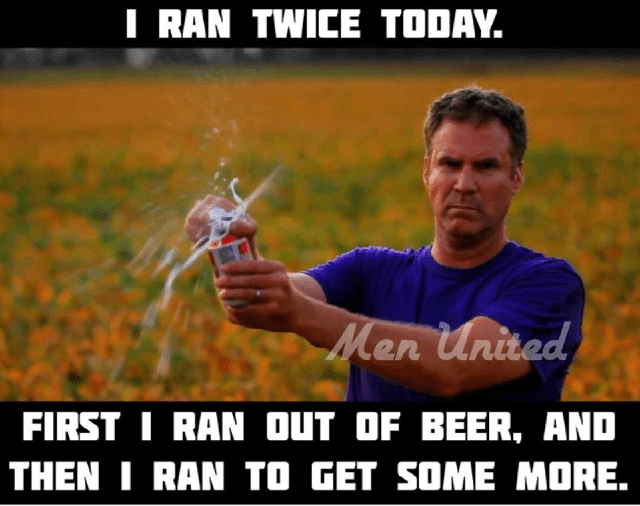
Deployment of different coping strategies for different types of setbacks
My brain has one setting for when things go wrong: rage.
And to be honest, it really isn’t the best strategy for any kind of setback, except maybe an all-in-brawl and I’ve never actually had one of those (I only remember one light ‘scrap’ in primary school).
Over time, you learn that different setbacks require different responses.
Is the situation you find yourself in fixable? – then focus your efforts on solving the problem, brainstorming and trying different solutions, or seeking professional advice if you don’t know the answer. Take a practical approach. Try to leave self-criticism out of the picture and focused instead on tangible steps to address the issue.
If the situation isn’t really fixable, you might need to draw on strategies focused more on managing the emotional impact of the setback. Such strategies involve self-soothing, short-term avoidance/distraction, trying to take different perspectives on the situation, and searching for meaning or silver linings in what has happened. I put a few strategies in this post on handling a meltdown.
Just the realisation that there are different coping strategies can for some be a significant advance on their existing coping skills. Over time you get better at picking what coping strategies work best for different situations.
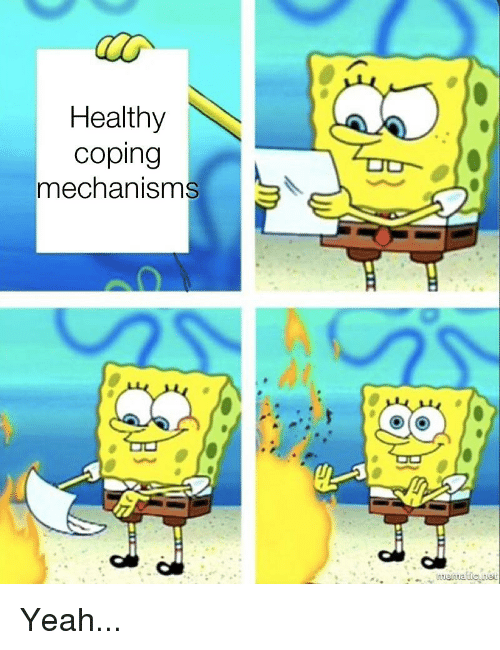
Mental rehearsal for coping with known stressors
Some setbacks sneak up on us and take us by surprise.
But many are probably quite predictable. For example, we can pretty much guarantee that during stressful periods (e.g. exams, assignments due) we’re more likely to get sick. You can also pretty much guarantee that at some point you’ll get a mark on an assignment or exam that is significantly below what you expected. It is also fairly wise to factor in your car breaking down, large unexpected expense, forgetting someone’s birthday etc. You know what I am talking about. What can go wrong, often will.
One psychological tool that I like, which I took from sports psychology, is mental rehearsal. This tool involves imagining in detail how one will handle an upcoming event. Sports people use it to visualise their performance/tactics/routines for high pressure situations. If you’ve ever watched the cricketer Steve Smith when he isn’t actually batting, he is rehearsing batting. Running through different deliveries, shots and scenarios in his head (sometimes with accompanying movements).
Mental rehearsal drastically increases the time spent ‘practising’, and whilst it might not quite be as good as actual practice, it is still highly valuable.
You can use mental rehearsal with upcoming stressful events. Cast your mind forward and imagine yourself implementing some good study strategies in the weeks leading up to your exams. Imagine in detail how your study days will unfold. Visualise yourself at your desk and the routines you will use to get through all the material. Visualise yourself fronting up at the exam and the strategies you will use to keep your nerves in check.
This process acclimatizes you to the reality that the situation is likely to be stressful but allows you rehearse ahead of time how you are going to cope.

Financial literacy
As lots of people have discovered during this Coronavirus lockdown, financial security is a critical component of wellbeing.
In its most basic form, financial security is having some kind of safety-net in place for difficult times or unexpected expenses.
This may take the form of savings, investments, or trusted family members/friends who can assist.
Building a financial safety net as a student can be harder because generally student incomes are lower.
But you can start building the necessary habits for financial security at any stage of life and the earlier you start building them, the sooner you can achieve some financial security.
Central to building financial security are:
- budgeting: knowing your expenses and your income and modifying either until income>expenses
- saving: regularly putting aside the surplus from your budget into some kind of savings account and leaving it untouched
Conceptually, it isn’t any more complicated than that, although making it a reality can involve some trial and error.
Check out Moneysmart’s article on emergency funds.

Meaning and purpose
What the ultimate ‘meaning of life’ is is a topic for future debate.
On a smaller scale though, finding your personal meaning and purpose in life is important in providing you an anchor point during difficult times.
For example, students who are passionate about helping others, use this passion as a buffer against the challenges of studying their chosen degree (usually a degree in a health or welfare area like medicine, psychology, social work etc).
People who are passionate about starting their own business, use this passion as a buffer against the early challenges of getting a business up and running.
People who are passionate about travel use this passion as a buffer against being stuck in an office, earning the money necessary for their next trip.
I think you get the idea.
Things we are passionate about provide a buffer against the difficulties of life.
Don’t worry if you haven’t yet discovered or manifested your personal purpose yet. Even just setting goals, or working towards trying to make yourself a better person in some way can be sufficient buffers. If self-improvement is of interest to you, check out my stuff on mental fitness.
And don’t ignore the things that you just enjoy doing. Gardening, sport, games nights, movies…… Whatever you truly enjoy doing and engaging in those things regularly is part of the process of finding your own personal meaning in life.
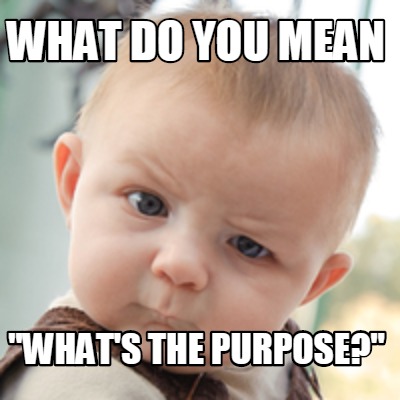
Surround yourself with good people
You want people around you that:
- are working towards similar or related goals, so you can support each other on the journey
- energise you, rather than drain your energy
- you want to spend time with
- encourage you, rather than discourage you
- inspire or motivate you
- make good choices in their own lives
That all sounds really obvious, but it is weird how many times I see people (myself included) surround themselves with people who don’t meet these criteria. It is almost like we want to sabotage ourselves sometimes by hanging out with people that don’t make us better.
When you’ve got good people in your life, invest time and energy in building and maintaining those relationships. It doesn’t take a lot. Express gratitude to those people for being in your life. Do the occasional random nice thing for them. Listen to them when they are talking about what they are working on and interested in. Ask them questions occasionally, showing that you’ve been listening.
Building good quality relationships isn’t just valuable when things are going well. Those relationships will be vital when things aren’t going well and you need to ask for help (see below). Our culture promotes high levels of self-sufficiency and whilst I think this is generally a good thing, the reality is we’ll all need to call on the assistance of others at times. When that time arrives for you, you’ll want to have strong relationships in place.

Ask for help when needed
Resilience is not necessarily total self-reliance.
There are times when you won’t know the answer to a problem.
There will be times when you are too distressed to be able to think clearly.
There will be times when the solution to a problem simply involves more than 1 person (you).
When this is the case, asking for help is critical.
I generally think of there being ‘layers’ of help in the average person’s life.
You start with friends and family and colleagues (layer 1). If they can’t help you might go online to find forums of people in similar situations (layer 2). If that isn’t quite right you might move up to trained professionals (layer 3). It might be the case that you call on multiple layers at the same time.
The layer you call on will depend on the nature of the problem and the level of trust required in the person helping you. Highly personal problems may require ‘best friends’ or close family members. Highly complex problems may require professional advice.
Asking for help is not a sign of weakness.
In fact, strategically asking for help at the right time is a skill that I see in highly resilient individuals.
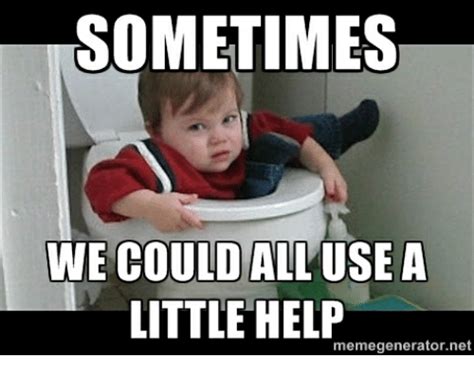
Adjust your expectations
We all walk about the world with our own mental models about how the world works, how to be around other people, what to expect in certain situations.
The more closely aligned those models are with reality, usually the more psychologically comfortable we are.
Psychological discomfort is often caused by a mismatch between our expectations and reality. Perhaps we believe that we can prevent ourselves from failing or getting hurt. Perhaps we expect a life without serious problems or setbacks. When those things inevitably happen, we can be derailed and discouraged. We become critical towards ourselves or others, or the world for ‘letting us down’. But the problem wasn’t that we failed or were hurt. It was that we expected otherwise.
However it works in the other direction also. We might become hopeless or cynical and expect only bad things to happen. We then stop noticing the good, the growth, love, happiness and contentment that are possible as well. We deny ourselves the opportunity to celebrate in the marvelous aspects of life.
Adjusting our expectations means having nuanced and sophisticated models of reality that include both the ‘good and the bad’. Not expecting perfection but not dismissing beauty and order either.
Such models are cognitively taxing, meaning it takes regular effort and energy to update our models of the world. It is tempting to stick to black and white views of reality, cause they are ‘simpler’ but they typically mean missing out on the good or becoming attached to the bad.
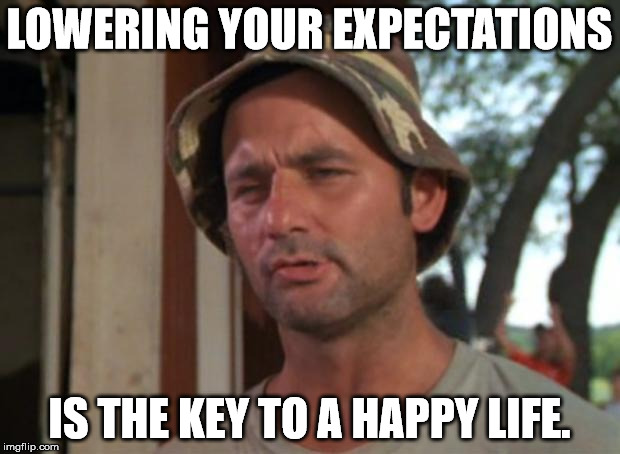
Final words
Despite my training, I used to think that wellbeing or resilience were things that ‘happened to you’. Kinda like lessons delivered to you from the universe on a pre-determined schedule.
As I’ve got older though, a better explanation is that wellbeing and resilience are things that you build, deliberately and intentionally through your choices and actions.
Life will hand you plenty of opportunities to practice this: setbacks, losses, failures.
You can’t avoid them.
But you can start putting things in place, in everyday life, to build yourself into the person that can confront these head on.
Keep an eye out for this wellbeing and resilience program running in the university or consider completing it online via their site. It will give you to the tools necessary to build your own wellbeing and resilience plan.

